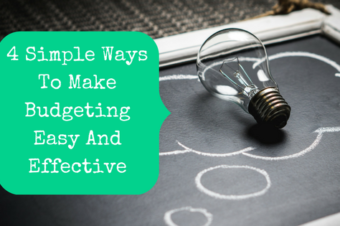
Do you feel like your money is all gone before you have a chance to spend it on what really matters to you? Here are 4 steps that you can take to ensure that your spending habits match up with your values.
How well are your finances aligned with your life? You may say that you value missions giving, or education, or healthy eating, but does your spending really reflect that? Are you actually giving to missions or saving for your kids’ education? Or do all of your other expenses just crowd those out?
For many people, what they say their priorities are and how they spend their money are two very different pictures. Matthew 6:21 so famously tells us that “where your treasure is, there your heart will be also.” What can you do to move your treasure to where your heart is and align your finances with your values?
Two Ways To Realign Your Finances
Realigning your financial habits will probably require some big changes. I’ve learned in life that those kinds of big changes usually only happen with one of two things: a drastic change in your circumstances or a strategic plan. The first is usually an unintentional consequence of something else happening in your life, and the second is usually a purposeful effort.
Changing Circumstances
For the sake of example, let’s talk about losing weight. At one time in my life, I lost a lot of weight with no effort whatsoever. How did I do that and why haven’t I gotten rich writing a book about it? My circumstances drastically changed. I left Bible college. The cafeteria there served two meals a day, and sometimes my lunch would consist of corn, mashed potatoes, and way too many delicious rolls. And they had chocolate milk on tap. And dessert every day.
Once I graduated, I was left to fend for myself and feed myself. I naturally did not eat as much and therefore lost a lot of weight. It lasted a year until I got married and started eating more again because my husband can’t survive on less than three meals a day like I can.
So, you see, you can make big changes without doing anything on purpose if you drastically change your circumstances. For some people, COVID has done that for them. For most of us, we would have to move to a third world country or go off the grid without access to Amazon. But is that really practical?
Purposeful Effort
The other way to make big changes in your life is by purposeful effort. Having a plan and sticking with it even when you don’t want to. Upon weaning my second child, I realized that I could no longer blame her for my physical condition. I was overweight and really needed to do something about it. I needed a plan to intentionally accomplish my goal.
After doing some research, I came up with a plan for how I would eat and exercise to be healthier. It required self-discipline and self-denial and it wasn’t easy. But, with forethought and discipline, I was able to change my habits. It wasn’t as easy as just graduating from Bible college and leaving the cafeteria behind. But it was the only way to make it happen.
For most people, the only way that you can align your money habits with your values is by making a plan and sticking with it, even when it is hard. Most people will not see a drastic change in their circumstances that will lead to different money management. If you want to change, you’re going to have to do it yourself. You can’t just wait for it to happen to you.
How To Make A Plan For Your Money
So how do you make a strategic plan that will enable you to align your finances with your goals? The following four things will make it possible for you.
1. Work As A Team
You cannot do this alone. If you are married and your spouse is not on board, you will fail. Both spouses need to sit down and come up with a plan that they are both happy with. It cannot be one person making the plan and the other agreeing to it. Both spouses must be involved in making the plan and both must be satisfied with the final product.
If you are single, it helps to get another person involved as an accountability partner and sounding board. You don’t have a built-in partner, as a married person does, but you get to choose who to work with and you get to make all of the final decisions, a luxury only available outside of marriage.
2. Know How Much Money You Bring In
It’s amazing how many people don’t even know how much money they make. A 2015 Fidelity survey even found that 43% of their respondents didn’t know how much their spouse makes. You need to know exactly how much money you have if you want to make a plan for what to do with it.
3. Plan Your Spending Ahead Of Time
Once you know how much money you will have, you need to plan out how you are going to spend it, before you even get it. Coming up with a plan ahead of time gives you the opportunity to think through spending decisions rationally and slowly, without having emotions or pushy sales people influencing your decisions.
If you truly want to align your spending with your values, you need to be proactive, not reactive. Looking at your income and expenses ahead of time allows you to decide if you really want to spend $200 eating out each month, or if you would rather put half of that towards your kids’ college fund. You have a much better chance of making a decision that reflects your priorities looking at it a month in advance than you will when you are cranky and hungry and not in the mood to cook on a Sunday afternoon.
4. Follow The Plan
The final step is to actually follow the plan. If you don’t actually do it, all of your strategizing is nothing more than ink on paper or a good idea, and it will get you about as far. Coming up with a plan that you and your spouse agree on can be hard, but actually sticking with it is where most people fail. You need the maturity and self-discipline to tell yourself you’re not eating out because it’s not in the plan, no matter how tired you are. You need the tenacity to tell your kids for the thousandth time that you’re not buying that toy because it’s not in the plan. And you need to always keep in mind that the plan is just a means to an end. The end is to have your treasure where heart is, funding what you truly value.




1 Response